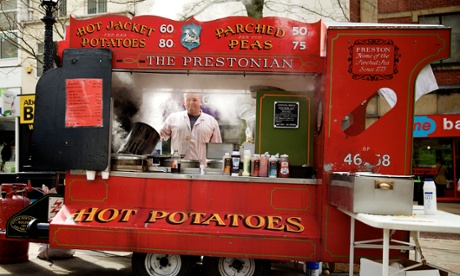
In the shadow of Preston’s Harris Museum & Art Gallery, Mark Roberts sells jacket potatoes from a custom-built miniature railway carriage, just as his father before him did for decades. Emblazoned across the side is “Preston: home of the parched pea since 1773.”
“Since the crash in 2008, the town has taken a dive,” said Roberts. “It’s not like the heyday of the 90s when it was properly busy. A lot of shops have closed since 2008 and been replaced by bookies and the like. The high street was dying on its feet six years ago.”
Preston has its fair share of betting shops, takeaways and fast-food places, and it was here that the first British Kentucky Fried Chicken outlet opened in 1965. But on a sunny March morning, it’s hard to believe that this city is home to the UK’s unhealthiest high street. People queuing for their 50p pots of Roberts’ parched peas (a local delicacy not unlike mushy peas that is best served hot) were sceptical.
“There is a lot of stuff like fast-food places in Preston but no more than anywhere else,” said Sarah Wright, 30, a sales assistant at local greengrocers, Thompsons. “I mean, look at Manchester. And it all depends on where you live. All cities have fast food.
“At Thompsons, we’re always busy. People travel far and wide to come and buy our fresh fruit and veg and we’re open seven days a week. The business has been going since 1905.”
A short walk from Roberts’s stall is the main shopping thoroughfare in Preston, Fishergate. It’s an eclectic mix of Victorian splendour and 1960s concrete boxes, replete with shops seen on every high street in the country, including Topshop, Boots, Waterstones and Greggs.
Like many northern towns and cities, Preston’s architectural elegance has the industrial revolution to thank, not least the cotton industry. When the sun shines, the 19th century sandstone buildings sparkle in the light, and locals spill onto the wide pavements outside cafes and restaurants. Chris Avery, 21, is assistant manager of the Olive Tree Brasserie, a Greek restaurant at the top end of Fishergate that’s all industrial chic and twinkly lights. He’s surprised to learn about Preston’s unhealthy – and unwelcome – accolade.
“There are takeaways and things like that but they are mostly down by the nightclubs and bars. I wouldn’t even know where there was a tanning shop or something like that. In fact, two or three gyms have recently opened up in and around Preston.”
Down at the other end of the main high street is one of Preston’s shopping centres. Unlike the more popular St George’s, Fishergate is quiet and has fewer well known brands. But in the basement, in a vast space once occupied by TJ Hughes, is an initiative hoping to make a difference to the local community.
Healthy Planet collects books otherwise destined for landfill or pulping and gives them away for free. It’s a national charity and has just celebrated its one year anniversary in Preston.
“A lot of libraries and bookshops have closed down,” said Jan Whitfield, an 81-year-old retired librarian who volunteers at Healthy Planet. “Since we’ve been here, we’ve given away over 160,000 books. And we give away anything up to 600 books a day. All sorts of people come in here and we’ve become a meeting place for people as well. We’re hoping to make it comfier for people so they can stay longer.”
She added: “Because of the internet, high street businesses are suffering. It’s understandable that shops are having problems. But it’s not just Preston where there are problems. Everywhere you go lots and lots of shops have closed.”

